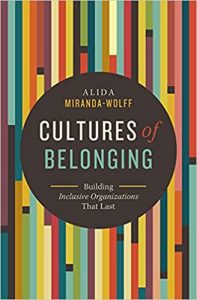The Power of Community in the Writing Process By Alida Miranda-Wolff
The Power of Community in the Writing Process
 By Alida Miranda-Wolff
By Alida Miranda-Wolff
Writing my book proposal came easily; placing that proposal with a publisher didn’t. Between 2018 and 2019, I decided I both wanted to realize my dream of becoming a published author and spreading messages around diversity, equity, inclusion, and belonging (DEIB). When it came to those early days of writing, the ideas and words flowed from me. I’d been storing them up in my research journal, through my regular blogging practice, and with every client interaction.
It was only when I’d found my agent and started pitching to publishers that self-doubt and rejection impacted my sense of free-flowing creativity. I am fortunate to have an agent who was willing to share rejection emails and feedback directly with me. I kept a log of every reason given from dozens of publishers. That log helped me identify a pattern, encapsulated in this short email from a top-four publisher:
“I would publish her, but no one buys books about diversity, equity, inclusion, and belonging. It’s something readers say matters to them, but sadly, that just doesn’t show up in the numbers.”
More than half of the rejections hinged on this idea – they liked my personal story around my own intersectionality as a Latiné woman with an invisible disability, appreciated the fact that I was “writerly” (since I formally trained in creative nonfiction and worked as a journalist previously), and they didn’t think what I was writing about was important enough to sell.
The verdict disillusioned me in more ways than one. First, my very reason for being, my calling, was being challenged. My dedication to DEIB was called naive, idealistic, and one that would surely be worn down by a supposedly insincere audience. And, I had only been running my DEIB firm, Ethos, for a year. My fledgling organization started based on my hard-won lessons around DEIB from four years of internal work, felt the most vulnerable it ever had at that moment. Rejection, in this case, was not just of my writing and my proposal, but also of my career and life choices.
By now, I know that many of you will read this and see a familiar story. Who likes being rejected by publishers? What matters about my story and what comes next is the part that matters most to my experience of the writing process and as a first-time author.
––––––––––––
In writing Cultures of Belonging: Building Inclusive Organizations That Last, I confronted so much insecurity, self-doubt, and internalized criticism that I started to learn lessons I never anticipated needing.
Let’s start with the sources of my insecurity. After rejections became overwhelming and a promising publisher relationship fell through, my agent and I decided to press pause on the process. We’d reached out to everyone, and no one was biting.
Five months later, George Floyd was murdered and the national protests in support of Black lives began. I sent a screenshot to my agent of the top ten books on Amazon – all of which were related to race, equity, and inclusion – with a question: “Are we sure the publishers are right that no one buys books on DEIB?” We agreed to re-pitch some of the more responsive and encouraging publishers, and by July, I had three offers. Nevertheless, the thought that this sudden change of fortune could be drawing on the suffering of communities of color and corporate opportunism plagued me.
Did I deserve to write this book? Who gets to write and be published and who doesn’t is a central question in my own equity work as a practitioner. Should I be one of the chosen few, especially given my own identity as a White person, of which 89% of published authors in the U.S are? Would my book, in this critical moment, even make a difference?
Then, there was a sense of practical insecurity. My business experienced double-digit growth across revenue, team size, and client portfolio size in 2020. Would writing a book by the end of January even be possible? Grappling with a pandemic, which severely exacerbated my existing chronic illnesses, at the same time as growing a business with too many clients to serve, all while tackling such an enormous project didn’t seem feasible.
Still, I said yes to the publisher I most trusted and signed a contract in September. By then, I had just four months to write the entire book, and I knew I couldn’t even start until the week of Thanksgiving due to an upcoming move, an average of 52 hours of meetings per week, and family responsibilities. So really, I had three months to fit in writing blocks in between all of my other commitments. I am certain that many people work well in these conditions; however, I am at my best when working ahead, engaging in first-minute rather than last-minute writing processes.
That’s when the writer’s block started.
I wrote and rewrote the same three chapters in my book for a full month. They were the framing chapters, the ones where I outlined our current and complexly changing moment, as well as established why belonging mattered during a time when justice and liberation were being viewed as in conflict with solidarity within my own communities. I shuffled and reshuffled index cards, not because I didn’t know what to say, but because I didn’t know how to say it. The psychic pressure of internalizing the earlier rejections – people don’t care about DEIB – and being hyper-aware of my White privilege, the challenge of a controversial topic still labeled by many as a “passing fad,” and the sheer generations-spanning enormity of the problems faced by the thirteen identities I study and advocate for in my work was more than I could handle. The inner chatter was exacerbating my migraines and impacting my sleep.
Yet, I was reluctant to move on to later chapters on the concrete models, processes, and practices I knew so well because those first three chapters were the most interesting to work out. I took half-baked ideas and fully realized them. I came to understand my relationship with DEIB and the world more deeply. I got to dig into theories that my clients generally found too abstract to let me pursue in my regular teaching and consulting work with them.
–––––––––––––––
It was the process of enlisting three trusted readers that helped me break free from my own rumination cycle. Knowing that I was writing to them, I could focus on the task of writing itself, rather than what other people may or may not feel about it later. And, I knew they would hold me accountable to representing myself truthfully, platforming underrepresented and non-dominant identities instead of co-opting them for my own benefit, and actually providing useful guidance.
With a clearer objective in mind, I focused on the chapters that I’d been writing in my mind and online for years. The core of my book, built around the recruiting, retention, promotion, and protection model (R2P2) we use with clients at Ethos, came smoothly. I knew I had ethical responsibilities in writing my book, and the simple fact of having a strong support system helped me shrink down the sheer range of responsibilities to what I could actually contribute.
Having people surrounding me during my writing experience, especially ones with a heartfelt desire to help, even if that meant questioning or challenging me, reduced the voices arguing in my head. In fact, it was the knowledge that my readers would question and challenge me that brought me back to my normal writing experience. I was able to set a consistent writing schedule and treat the work as work, rather than anything more complicated.
Ultimately, the most important lesson I learned from this writing process is one that I’ve been trying to share with others over the course of my career – the value of opening up and asking for help from a supportive community.
In the words of Mia Birdsong, “For people to be close enough to us that they can anticipate our needs, know what we want, and take their place in our lives…many of us have to let go of some of our orientation towards privacy and seclusion.”
—
 Alida Miranda-Wolff is the CEO and Founder of Ethos and author of the book Cultures of Belonging: Building Inclusive Organizations that Last, out February 15, 2022. Alida received her certification in diversity, equity, and inclusion from Georgetown University and has eight years of practitioner experience. In 2021, Alida was a recipient of the University of Chicago’s Early Career Achievement Award.
Alida Miranda-Wolff is the CEO and Founder of Ethos and author of the book Cultures of Belonging: Building Inclusive Organizations that Last, out February 15, 2022. Alida received her certification in diversity, equity, and inclusion from Georgetown University and has eight years of practitioner experience. In 2021, Alida was a recipient of the University of Chicago’s Early Career Achievement Award.
Clear, actionable steps for you to build new values, experiences, and perspectives into your organizational culture, infusing it with the diversity, inclusion, and belonging employees need to feel accepted, be their best selves, and do their best work.
Bypass the faulty processes and communication styles that make change impossible in so many other organizations; access these practical tools and ideas for increasing diversity, equity, and inclusion (DEI) in your company.
Filled with actionable advice Alida Miranda-Wolff learned through her own struggles being an outsider in a work culture that did not value inclusion, and having since worked with over 60 organizations to prioritize DEI initiatives and all the value and richness it adds to the workplace, this roadmap helps leaders:
- Learn why creating an environment where everyone feels belonging is the new barometer for employee engagement.
- Develop an understanding of the key terms around DEI and why they matter.
- Assess where your organization is today.
- Define and take the small steps that build new muscle memory into an organizational culture.
- Increase employee engagement, collaboration, innovation, communication, and sense of belonging.
- Build confidence in how to solve future DEI-related challenges.
- Get buy-in from colleagues (and even resisters) who can clearly see how to move forward and why.
Overcome any limiting work environment and build all new processes and communication priorities that allow your employees to be a part of something greater than themselves while your organization learns to value and embrace the unique experiences and perspective that each employee brings to the company.
Category: Contemporary Women Writers, How To and Tips
























